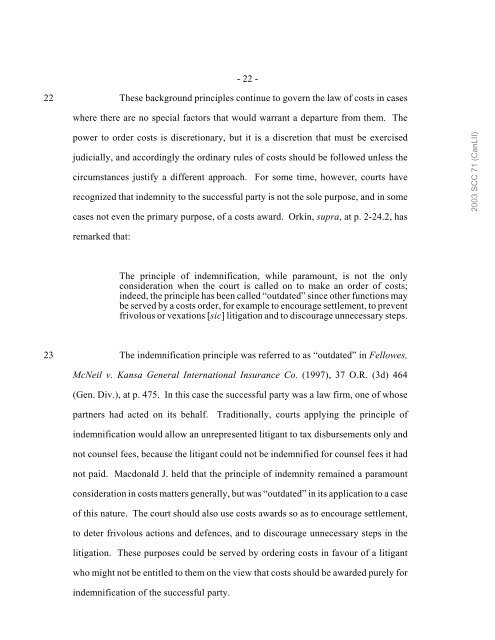court of appeal for ontario - academicfreedom.ca
court of appeal for ontario - academicfreedom.ca
court of appeal for ontario - academicfreedom.ca
You also want an ePaper? Increase the reach of your titles
YUMPU automatically turns print PDFs into web optimized ePapers that Google loves.
- 22 -<br />
22 These background principles continue to govern the law <strong>of</strong> costs in <strong>ca</strong>ses<br />
where there are no special factors that would warrant a departure from them. The<br />
power to order costs is discretionary, but it is a discretion that must be exercised<br />
judicially, and accordingly the ordinary rules <strong>of</strong> costs should be followed unless the<br />
circumstances justify a different approach. For some time, however, <strong>court</strong>s have<br />
recognized that indemnity to the successful party is not the sole purpose, and in some<br />
<strong>ca</strong>ses not even the primary purpose, <strong>of</strong> a costs award. Orkin, supra, at p. 2-24.2, has<br />
remarked that:<br />
The principle <strong>of</strong> indemnifi<strong>ca</strong>tion, while paramount, is not the only<br />
consideration when the <strong>court</strong> is <strong>ca</strong>lled on to make an order <strong>of</strong> costs;<br />
indeed, the principle has been <strong>ca</strong>lled “outdated” since other functions may<br />
be served by a costs order, <strong>for</strong> example to encourage settlement, to prevent<br />
frivolous or vexations [sic] litigation and to discourage unnecessary steps.<br />
23 The indemnifi<strong>ca</strong>tion principle was referred to as “outdated” in Fellowes,<br />
McNeil v. Kansa General International Insurance Co. (1997), 37 O.R. (3d) 464<br />
(Gen. Div.), at p. 475. In this <strong>ca</strong>se the successful party was a law firm, one <strong>of</strong> whose<br />
partners had acted on its behalf. Traditionally, <strong>court</strong>s applying the principle <strong>of</strong><br />
indemnifi<strong>ca</strong>tion would allow an unrepresented litigant to tax disbursements only and<br />
not counsel fees, be<strong>ca</strong>use the litigant could not be indemnified <strong>for</strong> counsel fees it had<br />
not paid. Macdonald J. held that the principle <strong>of</strong> indemnity remained a paramount<br />
consideration in costs matters generally, but was “outdated” in its appli<strong>ca</strong>tion to a <strong>ca</strong>se<br />
<strong>of</strong> this nature. The <strong>court</strong> should also use costs awards so as to encourage settlement,<br />
to deter frivolous actions and defences, and to discourage unnecessary steps in the<br />
litigation. These purposes could be served by ordering costs in favour <strong>of</strong> a litigant<br />
who might not be entitled to them on the view that costs should be awarded purely <strong>for</strong><br />
indemnifi<strong>ca</strong>tion <strong>of</strong> the successful party.<br />
2003 SCC 71 (CanLII)



